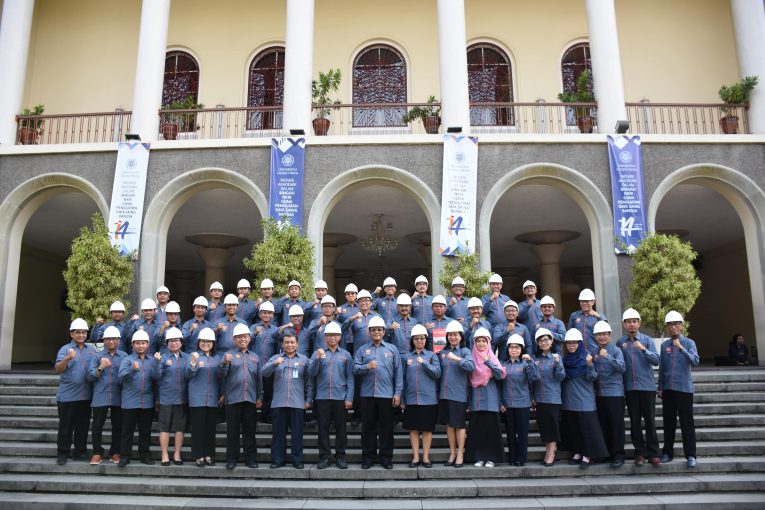
In order to deal with changes in the industrial era 4.0, it requires competent and adaptive animal science engineers. Especially during the Covid-19 pandemic, the changes were so rapid that livestock engineers were required to be able to make a breakthrough.
This was discussed in a webinar titled “Welcoming the Future Role of Animal Science Engineers” held Wednesday, June 17, 2020 by the Faculty of Animal Science (FAS) UGM.
“There are five global trends in this pandemic. First, social life leads to the online world. Second, the way we work changes, namely online. Third, the process of digitizing the industry runs more massively involving all industry chains,” said Heru Dewanto, Chairperson of the Indonesian Engineers Association.
Fourth, continued Heru, supply chain changes from global to regional. Previously, the supply chain focused on cost efficiency, now it has become resilience. Fifth, the existence of new globalization because supply chains going forward will be interconnected or multiple interconnected from regional/local supply chains.
“To welcome this new world, manpower must be prepared. Law number 11 year 2014 concerning engineering is a milestone in the beginning of the transformation of the implementation of engineers in Indonesia. This law is interpreted as a call from the state to make PII a shared house to build and produce competent engineers who are ready to advance the nation and are ready to compete on the world stage,” Heru explained.
To answer the call of the state, the process to produce superior engineers cannot be done in piecemeal because the output is highly determined by the input and process. Therefore, it should be known thoroughly the engineer value chain that starts from upstream to downstream. Upstream is when students are still studying, currently PII must start to contribute, namely through accreditation through an independent accreditation institution or BAN PT.
“The next value chain is the engineer study program, which is a program that brings back all engineers to reunite with the professional engineering degree program. The last value chain is the professional certification system for engineers whose output is the engineer who has been compared with engineers in Asia Pacific,” Heru explained.
Yudi Guntara Noor, the owner of PT Agro Investama who was also the speaker at the event said that the very dramatic and rapid changes during the Covid-19 pandemic required extraordinary and adaptive human resources for change.
“In the long run, there is a challenge, namely the provision of affordable and sufficient animal protein. For this reason, a research and development is needed so that livestock produce even greater,” Yudi said.
In the business world, consumers today are demanding more things, for example aspects of hygiene, standardization, halal certification, and so on. This change occurred very quickly, that is, since the pandemic. At this time the engineer must be able to change to a market that meets the standardization compliments, that is, change based on cold chain.
“Only that method can survive. Consumers are starting to leave the traditional market with little regard for hygiene aspects that they feel will have an impact on health. This change reaches 50% in the near future and will continue to grow if the Covid-19 pandemic is not resolved,” Yudi said.
Yudi gave an example, sacrificial worship which will be held in the near future switched to a live streaming system, packed meat, and delivered by motorcycle taxi online. This breakthrough took place quickly and needed adaptive humans. This is the function of animal science engineers going forward.
Another speaker, namely Prof. Dr. Muladno, MSA., S.Pt., IPU, lecturer at the Faculty of Animal Science of IPB defines the engineer as someone who is competent measurable and objective in carrying out all activities engineering in the field of animal husbandry.
Muladno explained, based on Law Number 18 Year 2009, livestock engineers must master the seeds, seeds, feeder, cultivation, feed, harvest, postharvest, marketing, and processing industries of livestock products.
“The person who runs these fields must be a professional person, namely a graduate of animal science. Thus, there is an inspiration in carrying out their duties so that they can make the right policies and decisions,” Muladno said.
Muladno added, to be able to meet the needs of goods and services of animal origin independently, competitive and sustainably to improve the welfare of farmers and the community, an engineer must take charge of the engineering activities of livestock engineers. These activities are livestock hatchery, breeding and producing techniques, breeding techniques, livestock raising techniques, livestock equipment and machinery techniques, postharvest harvesting and processing techniques.
Dean of UGM Faculty of Animal Science, Prof. Dr. Ir. Ali Agus, DAA., DEA., IPU., ASEAN. Eng hopes that the role of livestock engineers in the future will be increasingly needed in the context of the adequacy of animal protein from livestock. With the livestock engineer profession program, it will support the improvement of the quality of human resources, especially in the livestock industry
